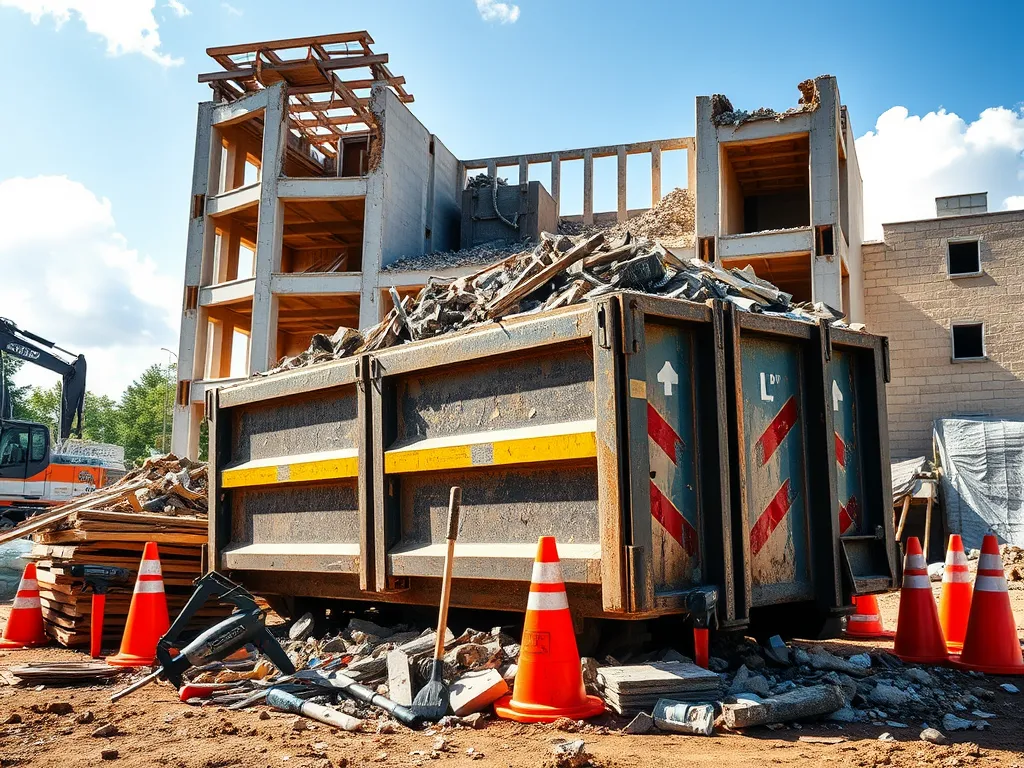Your Ultimate Guide to Dumpster Rental Demolition Services

Comprehensive Guide on Dumpster Rental for Demolition Projects
When embarking on any demolition project, one of the critical aspects to consider is effective waste management. Dumpster rental demolition services provide an efficient solution for the disposal of debris and materials that arise during the process. By renting a dumpster, project managers ensure that they have a designated space to dispose of waste, which saves time and helps maintain site safety.
For effective project management, refer to the Contractor’s Guide: How to Rent a Dumpster for Construction to streamline waste disposal.
The process of demolition often results in a large volume of waste, including concrete, wood, metals, and other materials. By utilizing dumpster rental demolition services, contractors can choose the appropriate dumpster size to accommodate their project's specific needs. This choice not only optimizes the workflow but also minimizes the risk of fines associated with improper waste disposal.
A dumpster rental not only facilitates the disposal of construction debris but also addresses the varied types of waste that can accumulate during demolition. From residential projects to large-scale commercial demolitions, understanding the scale of waste generated and the regulations surrounding it is crucial. Therefore, a reliable dumpster rental service will help navigate these complexities by offering tailored solutions.
Choosing dumpster rental services for demolition can significantly improve project timelines. Instead of making multiple trips to a landfill, having a dumpster on-site allows for quick disposal and keeps the work area organized. Ultimately, this leads to a smoother workflow and enhances overall productivity. By keeping the site free from clutter, workers can focus on the tasks at hand without unnecessary interruptions.
With a focus on eco-friendly practices, many dumpster rental companies provide recycling options for demolition debris. By opting for these services, businesses can help ensure that recyclable materials are processed correctly, contributing to a more sustainable environment. Implementing responsible waste management practices, such as those offered by dumpster rental demolition services, reflects a company's commitment to environmental stewardship.
Types of Dumpsters for Demolition
When planning a demolition project, it's essential to understand the types of dumpsters available for rent. Residential dumpsters are ideal for home demolition projects, typically ranging from 10 to 30 cubic yards. They cater to smaller-scale jobs and provide an efficient means of disposing of household debris like flooring, cabinets, and appliances.
For larger construction or commercial projects, roll-off dumpsters are more suitable. These containers usually have a larger capacity, ranging from 30 to 40 cubic yards, and handle substantial volumes of materials. Contractors often select these for significant demolitions, renovations, or site clearances requiring considerable waste disposal efforts.
In some cases, demolition projects involve hazardous materials that demand specialized containers for safe disposal. Companies offering dumpster rental demolition services provide containers specifically designed for hazardous waste, ensuring that toxic substances are handled correctly and in compliance with environmental regulations.
Understanding the various size and capacity options for demolition debris is crucial for efficient waste management. Dumpsters typically range in size from 10 to 40 cubic yards, allowing users to select one that best fits their needs based on the scale of the project. Choosing the right size ensures that the dumpster accommodates all debris while minimizing the likelihood of overflowing or space wastage.
When selecting the appropriate dumpster type for demolition, consider the volume and type of materials to be disposed of. Engaging with a dumpster rental service can help identify the best fit based on project specifications. Having the right type and size of dumpster ensures efficient waste removal and streamlines the entire demolition process.
Benefits of Dumpster Rental for Demolition
One significant benefit of renting a dumpster for demolition as opposed to purchasing one outright lies in cost-effectiveness. Renting a dumpster allows project managers to save on upfront costs, maintenance expenses, and storage fees associated with owning a dumpster. This flexibility enables companies to allocate resources more efficiently across their projects.
Time-saving is another advantage of utilizing dumpster rental for demolition. By having a dumpster on-site, teams can quickly dispose of debris without delay. Instead of spending time transporting waste to the landfill, workers can focus on their tasks, enhancing project completion timelines and increasing productivity.
When it comes to safety, dumpster rental services enhance conditions for workers and site operatives. By providing a designated space for waste disposal, the risk of injuries caused by tripping hazards is minimized. A tidy site reduces accidents, creating a safer environment for everyone involved in the demolition project.
Furthermore, dumpster rental allows for streamlined disposal of demolition waste. With a range of operational practices, waste can be efficiently sorted and disposed of according to local regulations. This structured approach ensures that demolition materials are dealt with promptly and responsibly, keeping the project moving forward without obstructions.
Additionally, many dumpster rental services offer environmentally friendly disposal options, which is crucial in today's eco-conscious society. They often have partnerships with recycling facilities or utilize processes that ensure debris is diverted from landfills whenever possible, promoting sustainable waste management practices and minimizing environmental impact.
How to Choose a Dumpster Rental Service
When selecting a dumpster rental service for a demolition project, certain key factors must be considered. Look for a company with a proven track record, positive customer reviews, and a variety of dumpster sizes to cater to different needs. Reliability and experience in the industry will contribute significantly to a project's success.
Comparing quotes and services from different providers is essential for ensuring you get the best value. Be sure to inquire about hidden fees and extra charges that could arise throughout the rental period. Analyzing quotes will help identify cost-effective options without compromising service quality.
Before committing to a rental service, read and understand the rental agreements thoroughly. Knowing the terms and conditions, including duration, fees, and responsibility for damages, is vital to avoid disputes later. A transparent rental agreement helps establish trust between the project manager and the rental provider.
Customer service and support are crucial during project execution. Opt for a dumpster rental company that offers accessible and responsive customer service. Clear communication during the project can help resolve potential issues promptly and efficiently, ensuring a smooth working relationship.
Lastly, ensure to check for any necessary permits and regulations that apply to your project. Not all locations allow for unrestricted dumpster placement, so understanding local laws will prevent potential fines or delays. A good rental service will guide you through these requirements to ensure compliance.
Steps in the Dumpster Rental Process
Scheduling your dumpster rental in advance is the first and foremost step to a smooth demolition process. It allows the chosen rental company sufficient time to prepare and deliver the appropriate dumpster size for your project, ensuring everything is in place before work begins.
Preparing the site for delivery and pickup is another essential step. Clear an area on your property where the dumpster will be placed to facilitate easy access. Choosing a location that does not obstruct traffic or operations is also critical for compliance with local regulations.
Understanding rental durations and corresponding fees is vital for effective project management. Most rental services offer various rental periods, allowing you to choose based on your project's time frame. Being aware of additional charges for extended rentals or overtime can help prevent unexpected costs.
Proper loading techniques for demolition debris can also influence the efficiency of waste disposal. Ensure that materials are correctly packed in the dumpster to maximize space and avoid overflow. Utilizing appropriate loading methods will streamline the collection process and help maintain site safety.
If your demolition project involves hazardous materials, arrange for their safe disposal as part of the rental process. Some dumpster services may offer specialized disposal options for hazardous waste, so be sure to communicate any specific needs with your rental provider to ensure compliance and safety.
Regulations and Legal Considerations
Understanding local laws regarding dumpster placement and rental is crucial for any demolition project. Each area has regulations governing how and where dumpsters may be placed, as well as set time frames for rental usage, to minimize potential disturbances to the community.
Permits may also be required for dumpster use at construction sites, especially if the dumpster will occupy public roadways or sidewalks. Before proceeding, verify that you have the necessary permits to avoid fines or project delays.
Disposal restrictions exist for certain materials in rental dumpsters, particularly hazardous or regulated waste types. Familiarizing yourself with these restrictions and consulting your dumpster rental service can help you plan for proper disposal channels.
Liability and insurance considerations for rental services should not be overlooked. Ensure that the chosen rental company has adequate insurance coverage to protect both parties in the event of accidents or damages. Reviewing their policies can help clarify expectations and liability concerns.
Finally, best practices for compliance with demolition site regulations include maintaining proper documentation and adhering to all local guidelines. Developing a checklist for compliance can be beneficial to ensure that the demolition project proceeds smoothly without legal complications.
